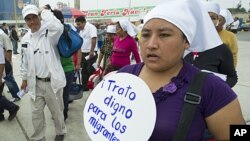The International Organization for Migration (IOM) warns that societies that deny migrants access to health care do so at their peril. To mark International Migrants Day Sunday, IOM is calling on governments worldwide to offer health services to all people, including legal and illegal migrants.
The International Organization for Migration says governments would be wise to grant migrants access to health services, if only for purely selfish reasons.
IOM notes deadly diseases such as SARS (Severe Acute Respiratory Syndrome) and Bird Flu are highly contagious. They travel around the world. They kill people indiscriminately - citizens and migrants alike. IOM argues excluding migrants from health care systems is both dangerous to the individual and to the public at large.
The agency considers migration one of the biggest challenges facing global health today. It says migrants face many barriers to health care. These include language or cultural differences, lack of health insurance and administrative hurdles.
Director of Migration Health at IOM, Davide Mosca, says undocumented or irregular migrants have the greatest difficulty in accessing health services. He says their legal status makes them vulnerable to exploitation and discourages them from seeking care.
“Even in the country where, the few countries that have given access to regular migrants to basic health care, sometimes they do not go for fear of deportation or different approaches in the politics of the country at that moment. And, they then resolve to go to these services only in emergencies. This, of course, is not the best way to do it for many reasons…First of all because it might be too late, because it might be too costly and certainly this would not have a good result on the health of the migrant,” Mosca said.
IOM says a delay in seeking care also increases public health risks, particularly if infectious diseases are involved. It says emergency care ends up being more expensive than if migrants had access to preventive and primary health care.
There are more than one billion migrants worldwide; 214 million of them have gone to foreign countries. IOM says every country in the world is either dependent on the labor, skills and knowledge migrants bring or on the money they earn.
IOM spokeswoman, Jemini Pandya, says most countries recognize that migrants are an economic necessity they cannot do without. She says it is to the benefit of societies at large to take care of their migrant populations.
“If you do not take care of the health of the migrants, many of the structures on which our societies and economies function today could not survive, could not cope ... Global development on every level could not continue. So, that health aspect is absolutely integral to every single aspect of our modern lives today - the health aspects of migrants," Pandya said. "And given that we are living in a world where dependency on migrants is ever growing, this is an issue that governments ignore at their peril, essentially.”
While the economic argument might be persuasive, IOM says it is important to recognize that migrants, above all else, are human beings. It says they should not be seen as a mere commodity, representing an economic value that is easily replaceable.
IOM argues that denying migrants access to health care is both a violation of their human rights and, ultimately, self-defeating.
Societies Deny Migrants Access to Health Care At Their Peril









